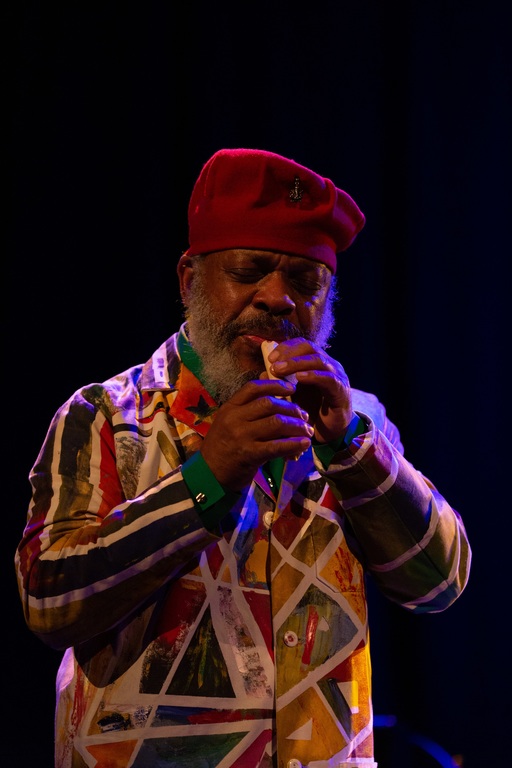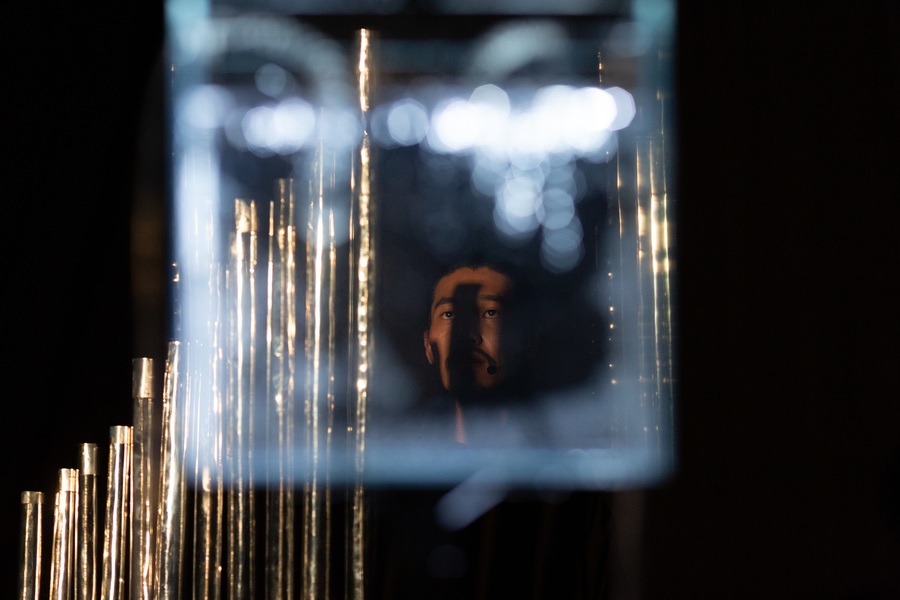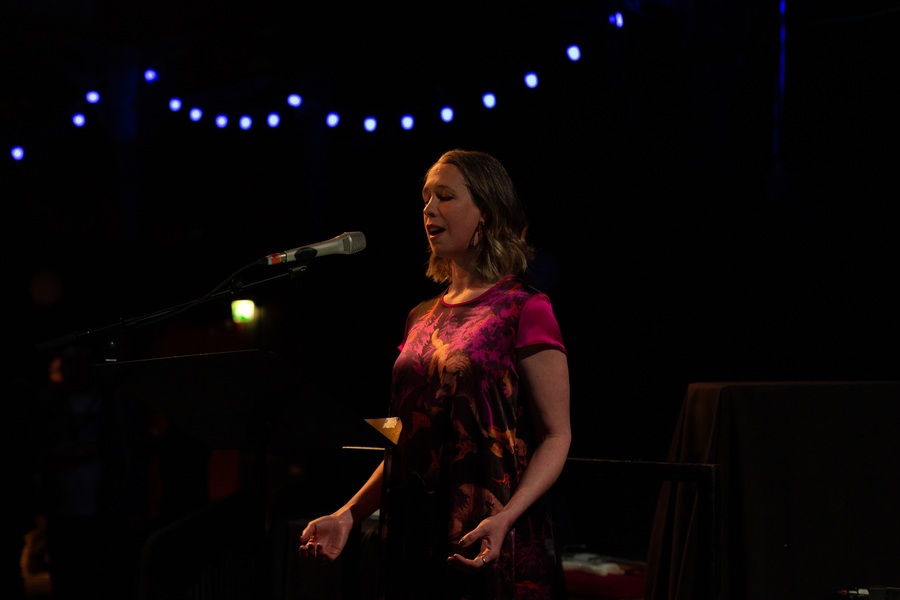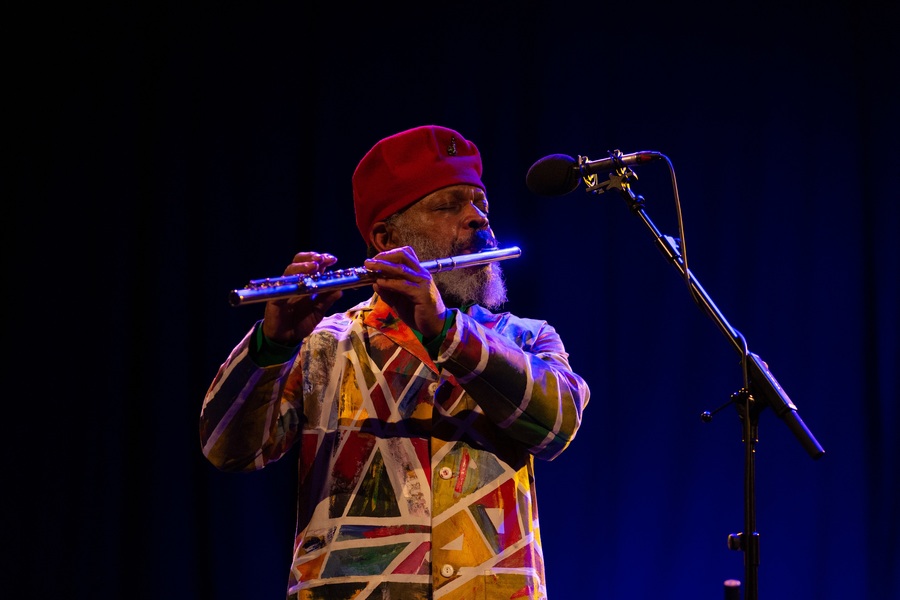Tectonics Festival, Glasgow, 30 Apr: The Report
After two years online, Tectonics festival returns to Glasgow City Halls with an abundant display of performers both international and local
Despite the website not being a good landing point for newcomers to Glasgow's Tectonics Festivals (there's a severe lack of information on both access and venue locations) there is still a lot of excitement to be had, and it's a joy to be lead through Saturday's delicate programme of new and experimental music at the City Halls & Old Fruitmarket.
The opening performance in The Grand Hall comes from Silvia Tarozzi and her group made up of Valeria Sturba, Stefano Pilia, Edoardo Marraffa and Cecilia Stacchiotti. They perform 2020's Mi specchio e rifletto (Unseen Worlds) in its entirety; the album is a spectacle in tonal shifts and so too is this performance as it switches between tense, through-composed pop structures, shimmering choral breaks and emotive peaks of disregarding, playful free improv including a section towards the end with radio sounds and toys.
There's a magic here in glimmers behind the curtain. The group can hold this restless space because of their caring, intimate dynamic and attention to one another as they perform. It's shown in an immaculate part of the title track, when each of them play in counterpoint, with a combination of choral rounds, guitar, saxophone and an arpeggiated synth. It's an unfolding and rebuilding of melodies and textures that construct an alarming unison of differences resembling a ‘theatre of the square’ with conversations snapping in and out of audibility, the sax overheard from the back of the stage. The album was written through the texts of poet Alda Merini and each track in its diffusion of genres and methods brings invigorating glimmers of the everyday, the mundane.
Next we catch The Beat Goes On – A Tribute to Janet Beat, part one of two over the weekend in which the works of the pioneering Scottish composer Janet Beat are responded to. Soprano Juliet Fraser stands at the far side of the Old Fruitmarket with “Chris on the gong, Christopher Edwards” on stage; the focal points are dislocated from one another provoking a tension, a confrontation in the performance as they face each other. Randomised and arpeggiated sounds fill the room in collision with the interruptions and calls from “Chris on the gong” and the tender, stunted melodies from Fraser. They all combine into a bricolage of disparity, and ooze an eerie feel of Beat’s work Puspawarna, originally written for gong and electronics. It is well suited to the Old Fruitmarket as we are pressed to take in the collisions of the operatic and the appropriated sounds of the gong(s) as one, but find it difficult.

Image: Douglas R. Ewart by Alex Woodward
One particular highlight comes from Fuji||||||||||ta’s performance of NOISEEM which takes place in the much smaller, bright white Recital Room. It is a sensation of water and air; there are three raised water tanks, transparent, lit with spotlights, with both hydrophones and air outlets ‘creating’ the disruptions in them. The bubbles are pushed around the hydrophones, creating a submerged, enveloping ambience. At the centre is Fuji||||||||||ta's self-built pipe organ, stunning in itself, and corresponding hand pump.
We’re invited to think through spectrums of the material as the amplified water sounds are passed through filters. The EQ shifts and glides from distant to intimate, then contrasts with the airy, layered textures of the organ and clicks of the hand pump. The pedal and drone of the organ force a material, concrete basis for the fading of the water’s evermore immaterial bubbling and thought. The performance is immense in its deep study of timbres.
Multi-instrumentalist Douglas R. Ewart and the Glasgow Improvisers Orchestra neatly align with Tectonics’ mission statement of “bringing international composers and having them perform alongside local composers.” Ewart introduces the recital with the back story of the work Red Hills, which is dedicated to the mountain range outside of Kingstown. He motivates us with: “If we don’t talk about change, then change won’t happen.” The Glasgow Improvisers Orchestra sparkle with Ewart’s charismatic and confrontational hand. His own instruments are used sparsely, the momentum and dynamism of the recital is geological, eruptive and provoking; it feels, in so many ways, an invocation to the challenges of growing, of climbing upwards and stamina or above all else becoming ourselves again.
The theme of becoming ourselves is threaded throughout this year’s invigorating programme. As we reenter these spaces we see artists reframing how we exist in them, how we shape one another in performance and experimentation. It is, above all else, a delight for the senses and a joy to be back at the City Halls.


